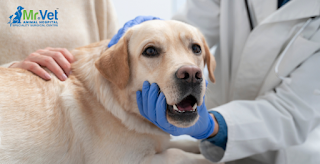Understanding Parvo in Dogs: Symptoms, Prevention, and Treatment
 |
| Parvo in Dogs |
Parvovirus, commonly known as Parvo, is one of the most dangerous and contagious viral infections affecting dogs, particularly puppies. It primarily attacks the intestinal tract, causing severe gastrointestinal distress. Without prompt treatment, Parvo can be life-threatening, making it essential for dog owners to stay informed about this disease. In this blog, we’ll discuss everything you need to know about Parvo in dogs, including its symptoms, prevention, and treatment options.
What is Parvo in Dogs?
Canine Parvovirus (CPV), or Parvo, is a highly contagious virus that spreads through direct contact with an infected dog or indirectly through contaminated surfaces like bowls, leashes, or the environment. The virus can survive for long periods, making it difficult to control and prevent. Puppies between 6 weeks and 6 months old are especially vulnerable, but older dogs can also contract the virus if they are unvaccinated.
Symptoms of Parvo in Dogs
Recognizing the early signs of Parvo is crucial for improving a dog's chances of recovery. Common symptoms include:
- Severe Vomiting: Persistent vomiting is often one of the first indicators of Parvo.
- Diarrhea (often bloody): Infected dogs typically experience severe diarrhea, which is often bloody and can lead to dangerous dehydration.
- Lethargy: Dogs with Parvo may become unusually tired, weak, and disinterested in activities.
- Loss of Appetite: Refusal to eat is another common sign.
- Fever or Hypothermia: Dogs may experience either an increased or decreased body temperature.
- Dehydration: Vomiting and diarrhea can quickly lead to life-threatening dehydration if not treated promptly.
Prevention of Parvo
Vaccination is the most effective way to prevent Parvo, particularly for puppies. Here are some key preventive measures:
- Vaccination: Puppies should receive their first Parvo vaccine between 6 and 8 weeks of age, with booster shots every 3-4 weeks until they are 16 weeks old. Adult dogs should receive regular booster shots to maintain immunity.
- Limit Exposure: Until your puppy is fully vaccinated, avoid areas where they may come into contact with infected dogs or contaminated surfaces, such as parks.
- Proper Hygiene: Clean all surfaces and items your dog interacts with, especially if they have been around other animals. Parvovirus can survive on surfaces like bedding, bowls, and even on human hands or clothing.
- Regular Vet Visits: Routine check-ups at a trusted veterinary clinic like MrVet Hospitals in Hyderabad or your local pet clinic in Gachibowli will ensure your dog stays healthy and up-to-date on vaccinations.
Treatment of Parvo
Parvo has no specific cure, but with immediate veterinary intervention, a dog’s body can be supported to fight off the virus. Treatment typically includes:
- Fluid Therapy: Rehydration is critical, as dehydration from vomiting and diarrhea is one of the biggest threats. Your vet will provide intravenous fluids to restore hydration.
- Medications: Anti-nausea and anti-diarrheal medications may be given to control symptoms, along with antibiotics to prevent secondary infections due to the weakened immune system.
- Hospitalization: Severe cases of Parvo often require hospitalization, where dogs can receive 24-hour care and monitoring at facilities like the veterinary hospital in Gachibowli.
Why Choose MrVet Hospitals for Parvo Treatment?
At MrVet Hospitals, we are dedicated to offering comprehensive, compassionate care for pets. As one of the best veterinary hospitals in Hyderabad, we provide top-tier facilities and experienced veterinarians to handle conditions like Parvo. Our pet clinic in Gachibowli is equipped with state-of-the-art diagnostic tools and advanced treatment options, ensuring your pet receives the best possible care.
Conclusion
Parvo in dogs is a serious and potentially fatal condition that requires immediate attention and veterinary care. Prevention through vaccination and regular vet visits is always better than treatment. If your dog shows any symptoms of Parvo, don’t hesitate to visit a reliable veterinary clinic like MrVet Hospitals, where your pet will receive the highest quality care to recover swiftly and safely.


Comments
Post a Comment